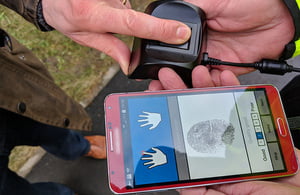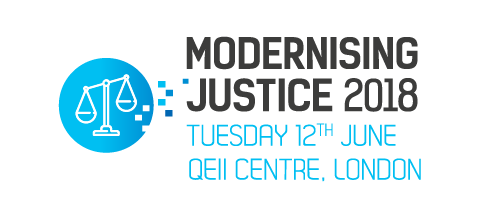Identification in less than a minute
Last week (10 February 2018), the Home Office announced a successful trial of a new mobile fingerprinting technology which will allow frontline officers across the country to use their smartphones to identify people in less than a minute – saving police time and reducing costs.
An app on an officer’s phone, combined with a handheld scanner, will mean police will be able to check fingerprints against both criminal and immigration records by connecting to the two live databases (IDENT1 and IABS) via the new Biometric Services Gateway.
West Yorkshire Police (WYP), who worked with the Home Office to trial the new system, will begin an initial roll out of 250 scanners to officers in the coming weeks – the app is already available to its 5,500 frontline officers. It is expected that another 20 forces across the country will roll out the system by the end of this year.
The Biometric Services Gateway, enabled by Home Office technology, will also lead to significant costs savings, with the new system available at a fraction of the cost of those currently in use. The scanners used by WYP cost less than £300 – 10% of the cost of current mobile fingerprint systems.

To ensure the information accessed from the Biometric Services Gateway remains secure, fingerprints are not stored and are automatically deleted from the device once they have been checked.
As well as identifying a person of interest who may be withholding their name, the technology enables officers to rapidly identify someone experiencing a medical emergency and make contact with their next of kin.
Early examples of the new system in action include a firearms unit, who detained a driver after a short pursuit and were able to identify him as a disqualified driver, despite him giving false details. He was issued with a summons for three offences and his vehicle seized. The armed response unit returned to patrol within ten minutes, and without the mobile fingerprint scanner this could have resulted in the unit being out of action for four hours taking the individual to a custody suite.
Massive efficiency boost
It seems clear that this is exactly the sort of digital development to make policing more efficient. Provided that the public are reassured that fingerprints are deleted from the system immediately and are not added to the database, there appear to be few downsides.
The only issue I can think of is whether they become an integral part of Stop and Search which may add to tensions between police and BAME communities when used inappropriately.
In the Home Office press release
West Yorkshire Police, Assistant Chief Constable Andy Battle set out the advantages from a policing viewpoint:
The introduction of these fingerprint devices is a significant step forward for West Yorkshire Police and marks another milestone in our technological ambitions.
As we have already experienced in the trial, the combination of these digital solutions bring tangible benefits to policing our communities.
It means we can submit fingerprints of suspects from the street to a live time national database and receive results in less than a minute.
We have seen first-hand, for instance, how this rapid identification has enabled speedy and accurate medical treatment based on the records available. Its use also allows relatives to attend hospital to see their loved ones when time is of the essence.
From an operational perspective, they quickly open investigative leads into serious crimes and can often reveal the associates of an otherwise unknown victim.
Likewise, they can immediately identify suspects who attempt to give false details and will prompt people to be more forthcoming in the first place.
The added benefit is that they provide greater value for money, which means we can increase their usage across the organisation.
Modernising Justice Conference
The smart solution to communication, information, and education in secure settings and beyond.
Socrates Software is working with Probation Services, Prison Services and some of the UK’s premierprivate companies bringing innovation and life-changing improvements to the sector by providing a “mobile mentor” via tablets and smartphones for Prisons and the Transforming Rehabilitation Programme.
The Future of Resettlement
Socrates 360, mobile mentor, is a true Through The Gates solution for the prison and probation sector. For use by prisoners, probationers and staff.









One Response
I find it staggering that only in 2018 that the Home Office is undertaking a trial of this age-old technology. How long have smart phones been around? How long have phone apps been around? How long have fingerprint scanners been around? Answer to all of these : years and years!
And why do the different Police Forces have to wait for the Home Office to run a trial before it can implement this obviously useful technology? The government(Home Office) should allow each police force to implement and trial and try and test their own technology initiatives, like this, as soon as they want to do so without having to wait years and years (as happened here) for the Home Office to arrange and organise the trial. The Home Office and by association the Government and Parliament need to “up their game” to allow/foresee technology like this. There are other technologies out there that are also very good ideas that would help other areas of police work Probation and Prisons. So are they, too, being delayed because those working at the Home Office, or worse Ministers, just haven’t got round to it yet!?! Staggering. Do you know what this looks like? It looks like those in Government and at the Home Office not really caring that much about those victim-ed or accused of crime. Those affluent and able to live in secure homes, use secure private transport, etc, i.e. those well paid Ministers and Managers at the Home Office, are at far less risk of being a victim of crime or being wrongly accused of a crime or coming into contact with a police officer or criminal investigation (is very traumatising by the way) and thus are not emotionally connected to the incredibly positive potential technologies like this can have on the averagely waged (or “horrors of horrors” the unemployed) person in the UK. In short, the delay looks like it has been caused by, out-of-touch Home Office decision makers and Ministers. Staggering.
Am also worried at West Yorkshire Police, Assistant Chief Constable Andy Battle’s comment : “From an operational perspective, they quickly open investigative leads into serious crimes and can often reveal the associates of an otherwise unknown victim.” What does “can often reveal the associates of an otherwise unknown victim” mean? And what is an “unknown victim”? And why would you want to know the identity of their associates? I, for example, always endeavour to associate with only those people whom I know or who are not likely to commit a crime against me, So, why is it important for Andy Battle to make his specific point, here, about associates as if this is an automatic thing to check when someone has been victim-ed to crime? Has it, also, occurred to Mr Battle that an “unknown victim” is not, necessarily, something that he or his police force should be concerned about? Some victims know they are victims and don’t want to report it to anyone including the police. And that is their legal right, by the way. If I were the Police Inspectorate I would keep a very close eye on the use of these scanners in case they are being used, when there is no investigative reason, against by-standers, associates (whatever that means) or on people who are BAME, Transgender. etc, etc.